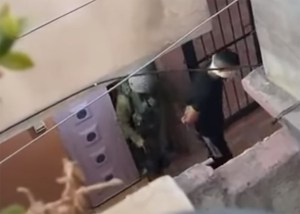CPJ Insider: February edition
Share this:
PRESS Act passes U.S. House unanimously in a win for press freedom

The PRESS (Protect Reporters from Exploitative State Spying) Act, which unanimously passed in the U.S. House of Representatives on January 19, would create federal protections for journalists’ sources by restricting law enforcement’s ability to access a journalist’s private reporting material and digital records. At CPJ, we have documented decades of government efforts to prosecute journalists’ sources under multiple administrations.
With the bill now in the U.S. Senate, we spoke with CPJ U.S. and Canada Program Coordinator Katherine Jacobsen about the bill and what it means for press freedom in the United States:
Why is the passage of the PRESS Act so important for journalists in the U.S.?
It is vital to have a federal shield law so that there are uniform protections for journalists across the United States. In late 2022, the Justice Department’s release of new guidelines to restrict federal prosecutors’ ability to obtain journalists’ digital records, like phone logs and emails, with very narrow exceptions. This was a major win. However, it was a change in guidelines, not a change in law. That’s an important distinction. Guidelines can change with different administrations. A law can have a longer shelf life, so to speak.
I also want to flag the very real and pervasive challenges to state shield laws that we’ve seen, most notably in the case of slain Las Vegas Review Journal reporter Jeff German. There was a long and contentious battle to get all of German’s unreported source material as evidence in the prosecution of his alleged killer. Fortunately, Nevada has a strong state shield law, which was upheld by the state’s Supreme Court. But it is still not comforting to think that the situation could have been different if it had happened in another jurisdiction.
What role has CPJ and its partners had in getting this piece of legislation before Congress?
CPJ worked closely with Sen. Ron Wyden’s office back in 2021 to draft the language of the bill. It includes a very broad definition of journalist, focusing on the act of reporting, rather than credentialing. We have worked with a coalition of other organizations to advocate for this piece of legislation on the Hill– many emails, social media campaigns and coffee meetings– to try and persuade lawmakers to pay attention. We are grateful that this legislation has received such widespread support across the aisle.
What’s next for safeguarding press freedom in the U.S., especially as the presidential election gets underway?
This legislation would address one of the frequent legal challenges that journalists face in the United States. However, while we acknowledge the progress made on that front, it is vital that we continue to push for safer working conditions for reporters across the country as we head into yet another contentious election season. CPJ research shows that elections–and protests that can occur around them–are times when journalists are at higher risk. CPJ has comprehensive safety material for reporters at the polls. We’re conducting safety clinics for journalists and newsrooms, especially those not used to reporting in high-risk environments. And we’re also speaking with a wide range of politicians trying to emphasize that press freedom is a cornerstone of American democracy.
CPJ releases annual prison census showing 320 journalists behind bars

CPJ released its annual prison census, which documented 320 journalists behind bars on December 1, 2023. The number was the second-highest recorded since CPJ’s prison census began in 1992 – a disturbing barometer of entrenched authoritarianism and the vitriol of governments determined to smother independent voices. Israel emerged as one of the world’s leading jailers of journalists following the October 7 start of the Israel-Gaza war. Israel ranked sixth – tied with Iran – behind China, Myanmar, Belarus, Russia, and Vietnam, respectively.
CPJ’s research also shows that more than half – 168 – listed in the census face false news and anti-state charges such as terrorism in retaliation for their critical coverage. In 66 cases, those held have not yet been told of the charges they are facing. They often face gratuitously cruel conditions, due process is frequently subverted as authorities prolong pre-charge and pre-trial detention of journalists, and journalists’ lawyers themselves face retaliation around the world. To learn more, you can read the prison census here or watch and share CPJ’s census video:
Must-read or watch
CPJ spoke via video call with Sandya Ekneligoda, wife of abducted Sri Lankan journalist and government critic Prageeth Ekneligoda, who has been missing for 14 years. A cartoonist and columnist, his disappearance happened just days prior to the election that gave incumbent President Mahinda Rajapaksa a sweeping victory. “When others are talking about my Prageeth,” Ekneligoda told CPJ, “it means he is still living in people’s hearts.”
CPJ joined five other press freedom and human rights organizations in a letter calling on U.S. President Joe Biden to act immediately and decisively to promote the conditions for safe and unrestricted reporting in the Israel-Gaza war. “We believe your administration can and must do more to effectively pursue accountability for journalists killed in the hostilities and to protect and support local and international journalists covering it,” the letter states.
CPJ joined seven other international press freedom organizations on Tuesday in a joint report after a mission to Athens in September 2023. The report concluded that Greece “has undergone a sustained decline in the last few years, amidst the broad-daylight murder of a crime reporter, multiple threats to the safety of journalists, a sprawling surveillance and…legal threats against media and journalists, with detrimental consequences for Greek democracy.”
CPJ in the news
“A Deadly Year for Journalists,” WNYC
“The Impossibility of Reporting the Story of Gaza,” The Nation
“Israel Must Safeguard Journalists in Gaza,” Haaretz
“Israel’s War on Journalists in Gaza,” Democracy Now!
“More than 300 journalists around the world imprisoned because of their work, report says,” The Associated Press
“Israel added to list of ‘worst jailers of journalists’ for first time,” The Guardian
“7 journalists behind bars in India, 5 charged under UAPA: CPJ,” NewsLaundry
“IAPA and CPJ mission analyzes “complex” situation of journalists in Guatemala,” La Nacion
“Committee to Protect Journalists releases annual prison census: Muthoki Mumo,” SABC News
